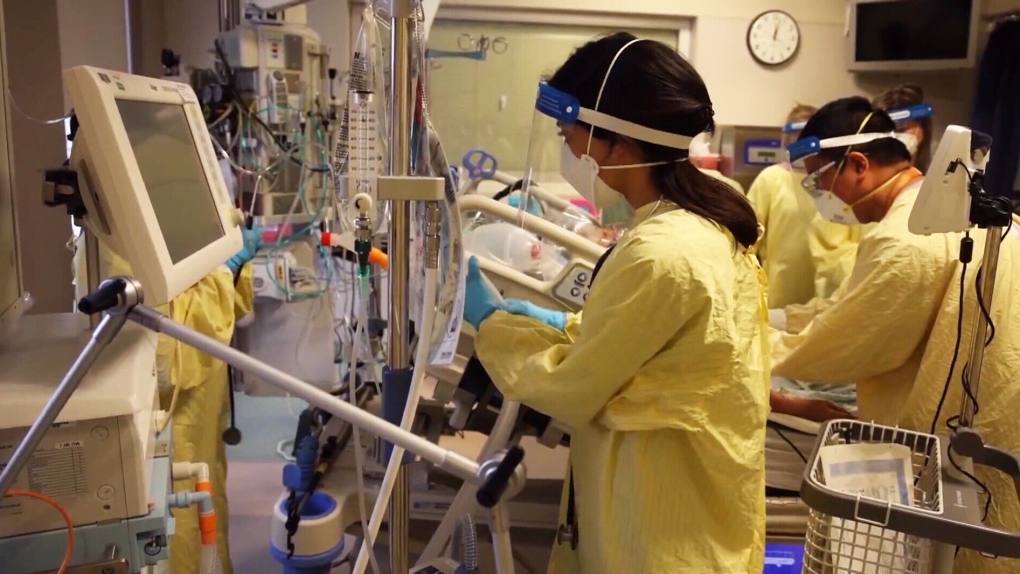B.C. COVID-19 update: Hospitalizations below 300 for first time since January

The number of COVID-19-positive patients in B.C. hospitals dropped below 300 on Thursday for the first time in months.
There were 298 test-positive patients hospitalized as of Thursday, a total that includes both those with serious illness and those admitted to hospital for other reasons who test positive incidentally.
The last time there were fewer than 300 people hospitalized with COVID-19 in B.C. was on Jan. 4, and that figure was recorded before the province stopped attempting to separate incidental cases from truly coronavirus-induced hospitalizations. If the Jan. 4 number had been recorded using B.C.'s current "hospital census" model for counting hospitalizations, it likely would have been higher.
The province doesn't attempt to quantify how many COVID-19 hospitalizations are incidental on a daily basis. A previous study conducted in the Vancouver Coastal Health region found that about 45 per cent of hospitalizations were incidental.
A total of 49 people were in intensive care with COVID-19 as of Thursday, according to the Ministry of Health.
B.C. also saw seven COVID-19-related deaths over the last 24 hours, bringing the provincial death toll since the pandemic began to 2,960.
Three of the latest deaths were in the Fraser Health region, two were in Northern Health, and the Vancouver Coastal and Island health authorities saw one death each.
The ministry does not publish information on the vaccination status of those whose deaths are attributed to COVID-19 on a daily basis. Data from the B.C. Centre for Disease Control shows that the largest number of deaths is among people with three doses of vaccine - a group that skews older and includes more than half of the province's adult population.
Relative to their share of the population, however, people who are unvaccinated are overrepresented among COVID-19-related deaths in B.C.
Between Feb. 8 and March 7, those who have not received any doses of a COVID-19 vaccine accounted for just 14 per cent of the population, but 26 per cent of deaths, according to the BCCDC.
On a per-capita basis, after adjusting for age differences in the makeup of the populations, there were 13.8 deaths per 100,000 unvaccinated people, compared to just 2.5 deaths per 100,000 people who have received three doses.
As of Thursday, 90.8 per cent of eligible people ages five and older in B.C. had received at least a first dose of vaccine, while 86.9 per cent had received two shots.
Among adults, 58.7 per cent have received a third dose, also known as a booster.
No new outbreaks of COVID-19 were declared in Thursday's update, and the outbreak at Greenwoods on Salt Spring Island has been declared over. That leaves B.C. with eight active outbreaks in its health-care system.
Like hospitalizations and ICU admissions, outbreaks have declined significantly over the last two months as the pandemic's Omicron wave has receded and the province has begun to ease restrictions.
As the B.C. approaches one week since lifting its mask mandate for indoor public spaces, the downward trends have, so far, shown no signs of reversing themselves.
The Ministry of Health announced 240 newly confirmed cases of COVID-19 on Thursday, a total that includes only positive lab tests, which are not available to most B.C. residents experiencing symptoms of the coronavirus.
The ministry does not report the results of rapid antigen tests, which have become more widely available in recent weeks in pharmacies across the province. Currently, anyone age 40 or older can pick up a free package of five rapid tests for at-home use once every 28 days.
CTVNews.ca Top Stories

Trump describes assassination attempt in personal detail as he accepts Republican nomination
Donald Trump, sombre and bandaged, accepted the GOP presidential nomination on Thursday at the Republican National Convention in a speech that described in detail the assassination attempt that could have ended his life just five days earlier before laying out a sweeping populist agenda, particularly on immigration.
Here's what happened on the final night of the RNC
The final day of the Republican National Convention was underway in Milwaukee where Donald Trump made a lengthy speech.
'We had a good run': High-profile Liberal minister quitting cabinet, not running in next election
Labour Minister Seamus O'Regan has announced he will not run in the next federal election, and will be quitting his cabinet position Friday.
Shannen Doherty granted divorce days after death
Shannen Doherty finalized her split with husband, Kurt Iswarienko, just hours before her death at age 53, and she was granted a rare posthumous divorce two days later.
B.C. woman who thought Coldplay concert 'was a date' must pay ex for ticket, tribunal rules
A B.C. woman has been ordered to repay her ex for a ticket to Coldplay's 2023 concert in Vancouver – in a small claims decision that highlights the distinction between gifts and loans under Canadian law.
Boy who was reported missing from a resort near Disney World found dead in water
A three-year-old boy who was reported missing from a resort near Walt Disney World in central Florida early Thursday was found dead in a body of water on the resort's grounds several hours later, the sheriff's office said.
Northern Ont. OPP sergeant charged with impaired driving
An Ontario Provincial Police sergeant with 26 years of experience has been charged with impaired driving in Cochrane.
Once defiant, Biden is now 'soul searching' about dropping out of race: Reuters source
U.S. President Joe Biden is taking calls to step aside as the Democratic presidential candidate seriously and multiple Democratic officials think an exit is a matter of time, Reuters reported, citing sources familiar with the matter.
2 dead after small plane crashes in Tofino, B.C.
Two people died and a third was seriously injured in a fiery plane crash in Tofino, B.C., on Thursday, according to authorities.

































